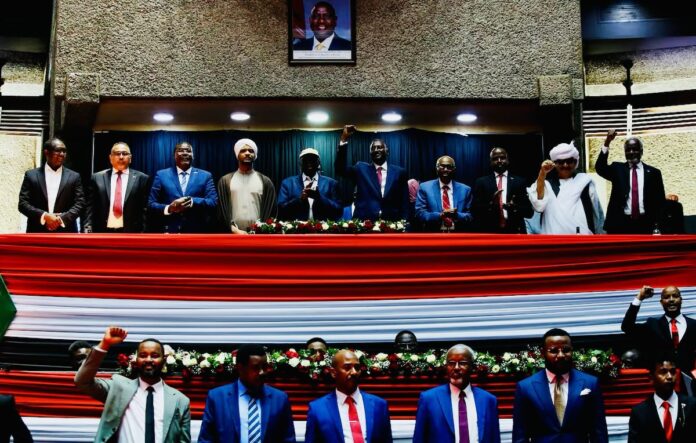NAIROBI, Kenya (Kaab TV) – Sudan’s Rapid Support Forces (RSF) and allied political and armed groups signed a charter late Saturday to establish a “government of peace and unity,” deepening the country’s fragmentation as its nearly two-year civil war rages on.
The signing ceremony took place behind closed doors in Nairobi, Kenya, following a high-profile meeting last week in a government-owned building.
That gathering drew condemnation from Sudan’s Foreign Ministry in Khartoum.
Among the signatories is Abdelaziz al-Hilu, a powerful rebel leader who controls significant territory and forces in South Kordofan.
Al-Hilu has long demanded Sudan adopt secularism.
While the newly declared government has raised concerns at the United Nations, it is unlikely to gain broad international recognition.
However, its formation underscores Sudan’s deepening divisions, with rival factions vying for control.
Civil War and Territorial Gains
The RSF has seized most of western Darfur and parts of the Kordofan region but is facing resistance from the Sudanese army, which is pushing back in central Sudan.
The army has condemned the formation of a parallel government, labeling it an illegitimate move.
Idris, a former official and leader of an armed group, stated that the new government’s official announcement will be made from within Sudan in the coming days.
According to the charter, signatories agreed that Sudan should be a “secular, democratic, non-centralized state” with a single national army.
However, it also allows armed groups to maintain their forces, signaling potential challenges to unifying military command.
The document asserts that the new government does not seek to divide Sudan but rather to unify the country and end the war—tasks it claims the army-aligned government in Port Sudan has failed to achieve.
International Reactions and Allegations
RSF leader General Mohamed Hamdan Dagalo, widely accused of human rights abuses, including genocide, was sanctioned by the U.S. earlier this year.
Dagalo had previously shared power with the army and civilian politicians following the ouster of Omar al-Bashir in 2019.
However, the RSF and the army jointly removed civilian leaders in a 2021 coup before turning on each other in a war over troop integration during Sudan’s democratic transition.
The conflict has plunged Sudan into an “unprecedented” humanitarian crisis, with famine looming in multiple regions and nearly half the population facing severe hunger.
Both the RSF charter signing and last week’s event were hosted in Kenya, sparking diplomatic tensions.
Sudan’s government has accused the United Arab Emirates of backing the RSF militarily and financially, an allegation supported by UN experts and U.S. lawmakers but denied by the UAE.
Meanwhile, Sudan’s military-aligned government in Port Sudan passed constitutional amendments this week, expanding the army’s powers.
General Abdel Fattah al-Burhan has signaled that a “war cabinet” will be announced soon.
As Sudan’s warring factions dig in, prospects for a unified and peaceful resolution remain uncertain.


